iPRIS aims to bridge the digital divide by boosting the capacities of African telecommunications regulatory authorities through peer-to-peer learning, in partnership with European counterparts. Designed as a dynamic capacity-building initiative, iPRIS is poised to revolutionise the landscape of National Regulatory Authorities (NRAs) and Regional Regulatory Organisations (RROs) across 43 African countries in the period 2023-2028.
iPRIS is funded by the European Union, Sweden, and Luxembourg as part of the Team Europe Initiative “D4D for Digital Economy and Society in Sub-Saharan Africa” (Code: 001).
November marked a significant milestone for the iPRIS project as we celebrated one year since the launch of our first capacity-building session in November 2023. In just 12 months, iPRIS has hosted three cohorts, engaging telecom regulators across Anglophone and Francophone Africa. Today, we are proud to collaborate with 21 African telecom authorities to drive meaningful social and economic transformation across the continent.
This past September, the iPRIS project held its first-ever iPRIS cycle for a cohort from Francophone Africa. The capacity building covered various topics, including consumer protection, spectrum management, regulatory frameworks, digital inclusion, and spectrum management. Participants also experienced Luxembourg’s cultural sites, including the Lëtzebuerg City Museum and the European Union Court of Justice.
In October, the Africa Regional Follow-Up phase in Dar es Salaam provided a platform for regulators from the second iPRIS cohort to showcase progress on their change initiatives, with sessions on project management, MEAL, cybersecurity, and legacy technology transitions enriched by insights from Ericsson Tanzania.
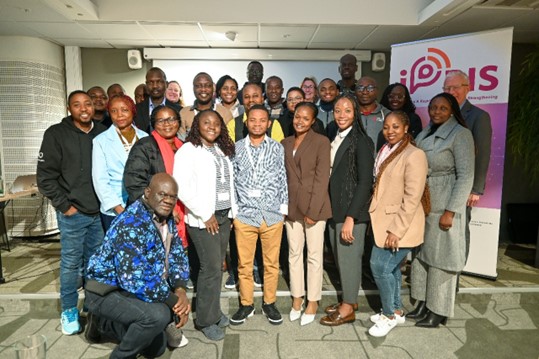
Group photo of the fourth iPRIS cohort.
This November 10–27th, we hosted our fourth iPRIS Cohort in Sweden for intensive 2.5-week peer-to-peer capacity building. Concurrently, the Africa Tech Festival was held in Cape Town, South Africa, from November 11–14 where the D4D Hub showcased its private sector advisory group.
In December, we will join the Internet Governance Forum (IGF) in Riyadh, focusing on policy, outreach, and capacity-building initiatives to maximise digital opportunities and address emerging digital risks. Please be sure to visit the iPRIS and D4D Hub booth if you are in attendance!
iPRIS is coordinated and implemented by SPIDER, in strategic and technical partnership with the Swedish Post and Telecom Authority (PTS) and the Luxembourg Regulatory Institute (ILR). It builds on the success of a similar programme implemented by SPIDER and PTS which engaged 27 English-speaking African regulators between 2016 and 2022.
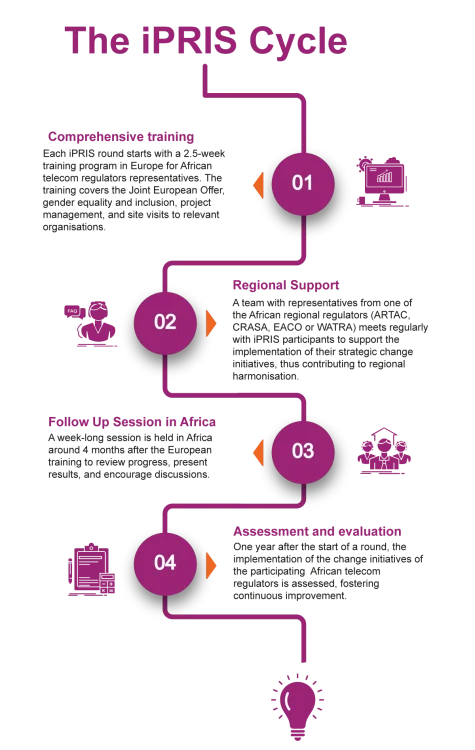
Currently, around 70 telecom experts from across Africa are taking part in the iPRIS peer-to-peer capacity-building cycle, playing a crucial role in expanding ICT access, fostering innovation, and unlocking development potential in their countries. Between 2023 and 2028, iPRIS aims to boost the capacities of telecom regulators in 43 African countries by creating opportunities for partnerships and tools that break down language barriers and stimulate European and African cooperation within and between continents.
Thank you for being part of this journey with iPRIS as we work to shape Africa’s digital future.
Dr. Caroline Wamala Larsson
Director, SPIDER
In a landmark move driven by its active participation in the ICT Policy & Regulation – Institutional Strengthening (iPRIS) programme, the Information and Communication Technologies Authority of Mauritius (ICTA) has announced comprehensive cybersecurity guidelines for all licensed telecommunication operators. These guidelines are designed as robust self-assessment tools, enabling operators to critically evaluate and enhance their security preparedness. The guidelines are available here
ICTA delegates part of the second round of iPRIS
Three ICTA representatives, Mr. Trilok Dabeesing, Director of IT, Ms. Priya Chutoorgoon, Legal Officer, and Mr. Pralash Nahullah, Engineer, Licensing officer, are currently engaged in the 13-month-long iPRIS peer-to-peer learning programme as part of the second iPRIS Cohort (2024 A). iPRIS aims to bridge the digital divide by boosting the capacities of African telecommunications regulatory bodies through peer to peer learning.
In May 2024, they started the peer-to-peer learning programme by participating in an intensive three-week peer-to-peer learning session in Stockholm Sweden. The sharing of best practices among African and European peers during the iPRIS European Phase in May significantly inspired ICTA's efforts to strengthen cybersecurity measures within the telecom sector.
The intensive session for the 2024 A cohort included participation by European (PTS and ILR) and African NRAs from Gambia, Lesotho, Rwanda, Tanzania, Uganda, and South Africa and regional regulatory bodies from West, East, Southern, and Central Africa.
The NRAs represented in the 2024 A cohort include The Gambia’s Public Utilities Regulatory Authority (PURA), Lesotho Communications Authority (LCA), Rwanda Utilities Regulatory Authority (RURA), Independent Communications Authority of South Africa (ICASA), Tanzania Communications Regulatory Authority (TCRA), and Uganda Communications Commission (UCC).
Strengthening the ICT security framework of Mauritius
These newly issued guidelines represent a pivotal step towards strengthening the security framework of Mauritius' telecommunications infrastructure. They reflect the nation’s commitment to staying ahead of evolving cyber threats and ensuring resilient digital connectivity.
“In Mauritius, telecom companies have traditionally self-regulated their security standards. However, in response to the rapidly escalating cyber threat landscape inherent in IP networks, there is a need to mandate that telecom service providers better manage security risks. The guidelines will not only enhance the security and resilience of nationwide infrastructure but also improve the management of security risks within their supply chains, including third-party suppliers”, Mr. Trilok Dabeesing, Director of IT at ICTA.
The authority will use these guidelines as a benchmark to issue forthcoming regulations to all telecommunication operators. These regulations will be issued at least six months after the date of issuance of the present guidelines and will be grouped into the following categories:
“The current 5G rollout necessitates a robust security regulatory framework due to its software-driven and virtual nature. Initially, based on these guidelines and forthcoming regulations, the first Directive to be issued by the Authority will extend them to other licensees”, Mr. Trilok Dabeesing, Director of IT at ICTA.
The guidelines are based on 29 security objectives aligned with the work of the European Union Agency for Cybersecurity (ENISA). These objectives outline security measures and evidence for their implementation. By implementing these guidelines and forthcoming regulations, Mauritius aims to enhance the security and resilience of its telecommunication infrastructure in the 5G era.
-END-
About iPRIS
ICT Policy & Regulation – Institutional Strengthening (iPRIS) contributes to bridging the digital divide by boosting the capacities of African telecommunications regulatory bodies. Engaging 43 countries in Africa, iPRIS aims to enhance inclusive digital connectivity and drive social and economic prosperity using ICT.
iPRIS provides peer-to-peer capacity-building for African National Regulatory Authorities and Regional Regulatory Organisations. It stems from the recognition of the significance of ICT policies and regulation in promoting digital inclusion, equitable access to the Internet, consumer rights protection, and personal data safeguarding.
The iPRIS project is implemented by SPIDER (the Swedish Program for ICT in Developing Regions ), The Swedish Post and Telecom Authority (PTS), and the Luxembourg Regulatory Institute (ILR). SPIDER coordinates the project and offers its expertise in the digital international development sector and in Diversity, Equity, and Inclusion (DEI). PTS is regulation content and policy lead for the project. ILR brings its expertise in European regulation and policy for the French speaking countries.
iPRIS is funded by the European Union, Sweden, and Luxembourg as part of the Team Europe Initiative “D4D for Digital Economy and Society in Sub-Saharan Africa” (Code: 001).
For more information, please contact
Ms. Edna Soomre
Project Lead iPRIS
ipris@spidercenter.org
The 2023 EACO Communications Sector Regional Report was launched on 24 June 2024 during the 29th Annual Assemblies and Extra Ordinary Congress of EACO in Nairobi, Kenya. This 17-page report consolidates data analysed by the East Africa Communications Organisation (EACO) secretariat using inputs from the EACO databank. The indicators align with those reported in the ITU, ensuring consistency and reliability.
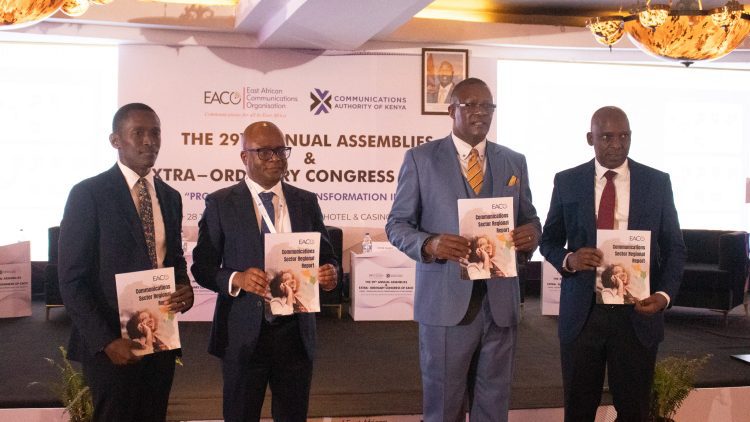
In the report foreword, Dr Ally Simba, Executive Secretary of EACO, explains, “Our region has witnessed remarkable advancements in network coverage, a surge in mobile and internet subscriptions, and notable growth in mobile money services. These developments have driven socio-economic growth, fostered digital inclusion, and enhanced connectivity across East Africa.”
Here are some highlights from the report:
EAC Telecom Statistics 2023
Network Coverage
Telephone Subscriptions and Mobile Data Tariffs
The mobile industry in East Africa is experiencing significant growth, with the average mobile penetration rate across the region reaching 100% in 2023. This growth outpaces both the average of the ITU Africa region (92% in 2023, up from 82% in 2021) and the global average (111% in 2023, up from 107% in 2021).
East Africa is one of the fastest-growing mobile markets in the world, and this growth is expected to continue in the coming years. This presents a significant opportunity for mobile operators, handset manufacturers, and other players in the mobile ecosystem.
The influx of low-cost smartphones from Chinese manufacturers has made mobile phones more accessible to a wider population. Increased competition among mobile network operators and government interventions have also driven down data costs, making internet access more affordable.
Services like M-PESA in Kenya have created a financial ecosystem reliant on mobile phones. The average mobile internet penetration in the East African Community region increased from 49% in 2022 to 51% in 2023.
Mobile data prices have fallen significantly across East Africa between 2020 and 2023. The falling price of mobile data, combined with the proliferation of smartphones and tablets, suggests that mobile data is becoming the primary way people access the internet in East Africa.
Domestic Voice Traffic
The domestic voice traffic segment in the ICT sector across the East African market has exhibited diverse performance trends from 2022 to 2023.
Key advancements in the EAC
The 2023 report highlights the significant progress in the telecommunications sector across the East African region. Key advancements in network coverage, mobile and internet subscriptions, and mobile money services have driven socio-economic growth, fostered digital inclusion, and enhanced connectivity. The East African mobile market continues to expand rapidly, presenting numerous opportunities for stakeholders. The falling data costs and increasing smartphone accessibility underscore the region's shift towards mobile data as the primary means of internet access. This growth trajectory is expected to persist, further solidifying East Africa's position as a dynamic and fast-growing telecommunications market.
The 29th Annual Assemblies and Extraordinary Congress of EACO will take place from 24-28 June 2024 at the Safari Park Hotel in Nairobi, Kenya. Hosted by the Communications Authority of Kenya (CA), this event will provide a unique platform for EACO members and stakeholders to interact, network, exchange experiences, and share insights under the theme "Promoting Digital Transformation in the EAC Region." Delegates to these Assemblies will include policymakers, legislators, regulators, ICT sector operators/service providers, academia, and ICT consumers from across the East African region.
We are pleased to announce that Dr. Bengt Mölleryd from SPIDER will deliver a keynote address during the high-level roundtable discussion on "Promoting Digital Transformation in the EAC Region" on the first day of the Assemblies. The roundtable will follow the official opening, presided over by Mr. Eliud Owalo, ICT Cabinet Secretary of Kenya, and the unveiling of EACO regional statistics. It will also feature prominent figures from Tanzania's Ministry of Information, Communications and Information Technology, Communications Regulators' Association of Southern Africa (CRASA), South Sudan's National Communications Authority (NCA), Uganda Communications Commission (UCC), Safaricom Kenya and the African Advanced Level Telecommunication Institute (AFRALTI).
The Assemblies will also feature workshops, committee and working group meetings, assemblies’ meetings, and an Extraordinary Congress over the course of the five days.
Download the programme here
The 2024 AI for Good Global Summit, held in Geneva from 30 to 31 May, emphasised AI's role in addressing global challenges and advancing sustainable development goals (SDGs).
The AI for Good Global Summit is the leading action-oriented United Nations platform promoting AI to advance health, climate, gender, inclusive prosperity, sustainable infrastructure, and other global development priorities. AI for Good is organised by the International Telecommunication Union (ITU) – the UN specialised agency for information and communication technology – in partnership with 40 UN sister agencies and co-convened with the government of Switzerland.
The summit emphasised the global community's concerns and hopes for AI by 2030, particularly regarding its focus on profit maximisation and social control. It aimed to harness AI's potential for positive change through collaborative efforts and stakeholder engagement.
Opening Remarks by Doreen Bogdan-Martin
Doreen Bogdan-Martin, Secretary-General of the ITU highlighted the digital divide and the potential of AI to drive safe, inclusive, and sustainable advancements. ITU Secretary-General Doreen Bogdan-Martin stressed the importance of inclusive and secure AI governance, highlighting the need to bridge the digital divide with 2.6 billion people still offline“The AI genie is out of the bottle. And there's no putting it back. But I think there is hope. You have sent a strong message to the world that the future of AI is not yet written. And as we look to 2030 and milestones, like the summit of the future in September, and next year's WSIS + 20 review, I think now is the time. Now is the time that we have to redouble our efforts. Let's redouble our efforts. Let's make AI innovation inclusive. Let's build safe, secure trustworthy AI systems. And let's scale AI solutions so that we can rescue the SDGs.”
Future of AI by Azeem Azhar
Azeem Azhar, Founder of Exponential View unpacked the dual nature of AI as a technological boon and societal challenge, with applications in education, geospatial data, and language processing. "In Tanzania, an energy company used data from Atlas AI to identify 75,000 households who could benefit from solar-powered electricity."
Tristan Harris, co-founder and executive director of the Center for Humane Technology highlighted the risks and governance gaps in AI development. "There's a thousand to one gap between the collective resources going into increasing AI capabilities versus those that are increasing safety."
Anna Koivuniemi, Head of Google DeepMind Impact Accelerator discussed AI's role in monitoring weather patterns, optimizing power grids, and developing biological systems to combat climate change. "There are much more important cases of extreme weather events like floods or forest fires that are today a reality; predicting them better may save lives."
Gita Gopinath, First Deputy Managing Director of the IMF discussed AI's potential risks in labor markets, financial markets, and supply chains, particularly during economic downturns. "Companies tend to replace humans with automation during downturns, leading to job losses. AI could accelerate this trend."
Hao Li, CEO and Co-Founder of Pinscreen discussed the transformative potential and ethical considerations of generative AI. "Together with the World Economic Forum, we've developed the first real-time deep fake technology to showcase that it is possible actually to have live conversations with a fake person."
Chieko Asakawa, IBM Fellow discussed how AI technology empowers people with disabilities, such as the AI Suitcase for the visually impaired.
Dr. Hakim Hacid, Acting Chief Researcher at the Technology Innovation Institute (TII) discussed the critical need to democratize AI and address the "AI divide" between nations and institutions. "These people who can access and use this AI are in a specific place of the globe, usually the northern hemisphere."
In conclusion, the 2024 AI for Good Global Summit underscored AI's immense potential to drive positive change across various sectors while highlighting the need for inclusive, ethical, and sustainable governance frameworks. The event fostered meaningful discussions and collaborative efforts to shape an AI-driven future that benefits all of humanity.
Umuntu ngumuntu ngabantu (I am because you are). Happy Africa Day!
As we commemorate Africa Day on May 25th, a significant event that celebrates achievements and acknowledges current progress towards Agenda 2063, we are reminded of the essence of Ubuntu. This African philosophy underscores the power of collaboration and the value of collective effort and resonates deeply with the collaborative spirit of iPRIS.
AGENDA 2063 is Africa’s blueprint and master plan for transforming Africa into the global powerhouse of the future. It is the continent’s strategic framework that aims to deliver on its goal for inclusive and sustainable development and is a concrete manifestation of the pan-African drive for unity, self-determination, freedom, progress and collective prosperity
iPRIS aims to bridge the digital divide by enhancing digital connectivity across Sub-Saharan Africa and by creating opportunities for knowledge exchange amongst African countries and between the EU and Africa. Collaboration is the key to catalysing inclusive access and propelling digital opportunities to achieve prosperity and sustainability.
During the ongoing phase in Sweden, the second cohort of iPRIS, consisting of national regulators of Tanzania, Uganda, South Africa, Rwanda, Lesotho, Mauritius, and the Gambia, actively engaged in peer-to-peer learning sessions. This interactive platform facilitated the sharing of experiences with their fellow African and European counterparts and fostered a deeper understanding of the regulatory landscape in the telecommunications sector in Africa, Sweden (Swedish Post and Telecom Authority) and other countries in the European Union.
For the past two weeks now, in the true spirit of Ubuntu, the ICT regulators have been collaborating and boosting their technical abilities to shape and implement regulatory frameworks in the telecommunications sector in their respective countries.
The regulators have also evaluated their current country contexts and will work on change initiatives for the next 11 months. Change initiatives are strategic projects to bridge the digital divide by addressing challenges and opportunities within the ICT sector. They are the cornerstone of iPRIS and are specifically designed to align with the strategic agendas of regulatory bodies. The change initiatives focus on policy development and implementation linked to key issues within the ICT sector, such as infrastructure gaps, regulatory inefficiencies, or digital inclusion barriers
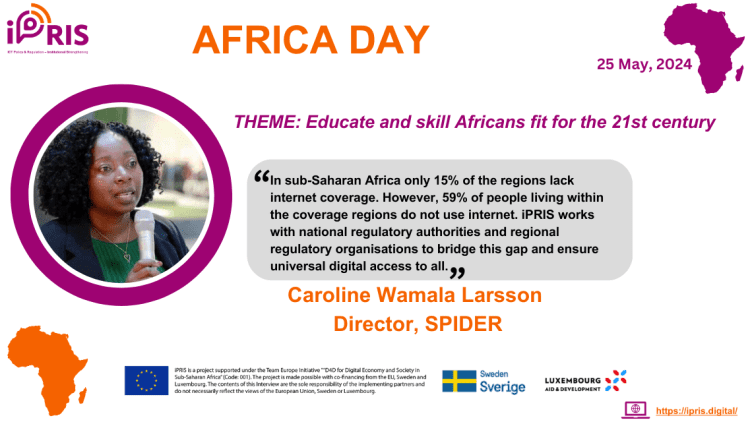
iPRIS targets 43 African countries to enhance inclusive digital connectivity and drive socioeconomic prosperity through Information and Communication Technology (ICT).
Dr. Caroline Wamala, Director of SPIDER, remarked, “iPRIS recognizes the crucial role of ICT policies and regulations in promoting digital inclusion, equitable internet access, consumer rights protection, and personal data safeguarding.”
The National Regulatory Authorities (NRAs) participating in the iPRIS 2024 May peer to peer training session in Sweden include:
Spotlighting ICT Regulators on Africa Day
On Africa Day, iPRIS highlights the efforts of these national and regional ICT regulators in championing the importance of ICT for enhancing educational outcomes. Regional and national regulators from the 2023 A and 2024 A cohort share their insights on leveraging digital technologies to drive development, enhance connectivity, and foster digital inclusion across the 43 countries involved in iPRIS.
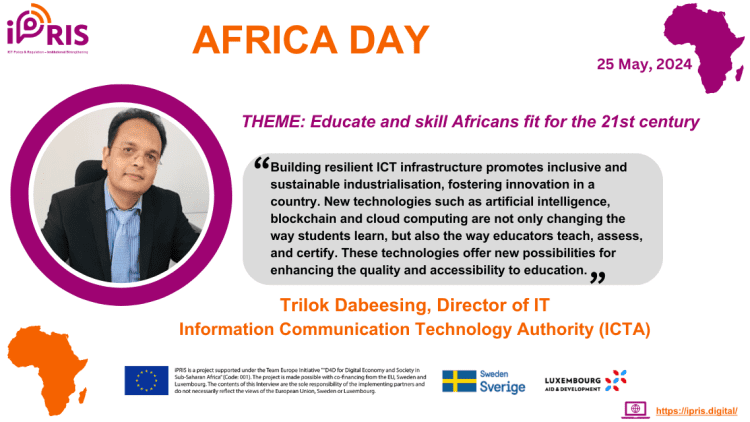
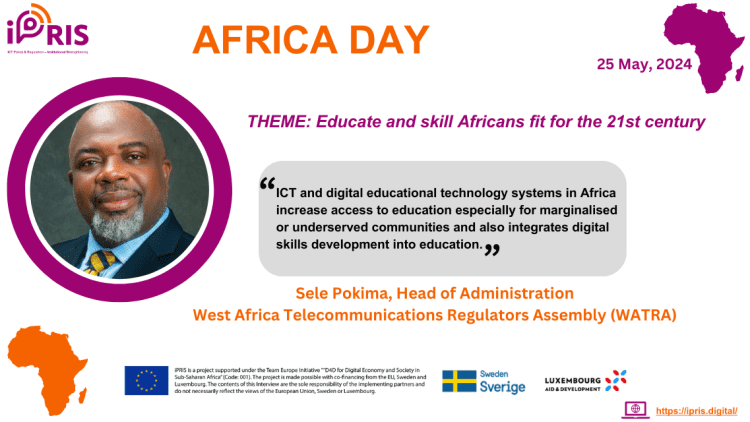
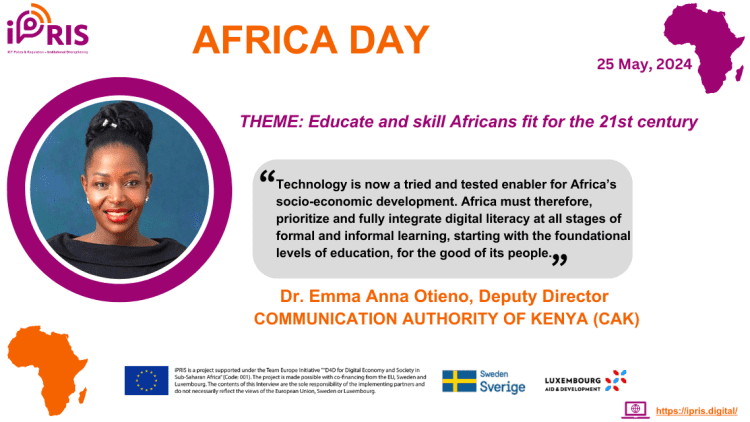
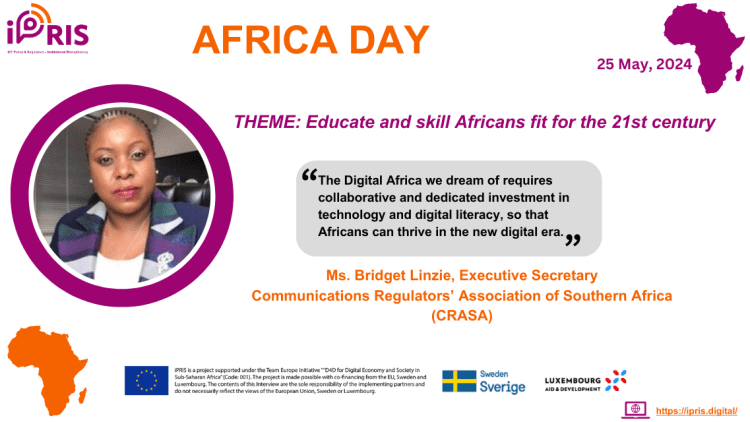
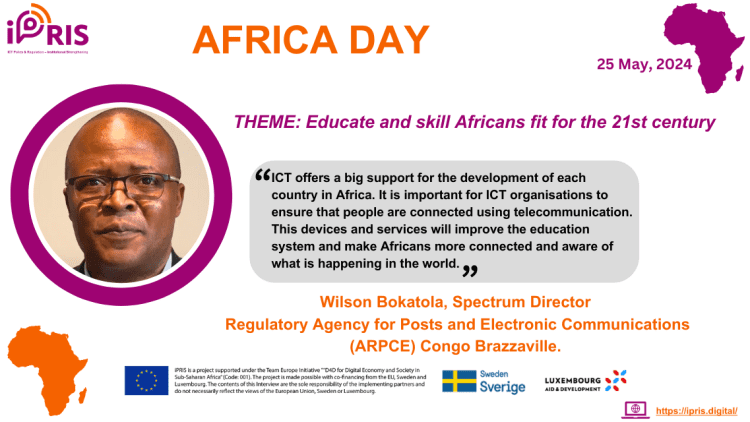
The Importance of Africa’s Digital Revolution
About 60 percent of the Africa continent population is below 25 years. Africa's has an opportunity to reap from the demographic divide and the digital evolution is recognized as a pivotal driver of socio-economic progress, creating employment opportunities, and improving overall well-being. The African Union (AU) emphasizes the transformative impact of digital technologies on the continent.African children and youth are at the forefront of this digital transformation. Access to quality education is fundamental for their development, and digital technologies provide opportunities to enhance the learning experience. However, educators need training, resources, and support to fully realise these benefits to integrate digital methods into their teaching. Schools must also have adequate resources and trained personnel to maintain and update technological equipment, ensuring its functionality and relevance. Empowering the learners with digital literacy skills is crucial to enable them to navigate an increasingly digitized world and participate meaningfully in the global economy.
Investments and policy interventions
Successfully navigating these challenges requires comprehensive policy interventions, significant investment in infrastructure, and robust capacity-building initiatives. By addressing these issues, Africa can harness the transformative power of digital technologies to advance education, promote inclusive development, and bridge the digital divide. As Africa celebrates its achievements and looks forward to future progress on Africa Day, the role of digital technologies in driving socio-economic development is more critical than ever. Initiatives like iPRIS exemplify the collaborative efforts needed to foster digital inclusion and connectivity across the continent, ensuring that all Africans can participate in and benefit from the digital revolution.
About iPRIS
ICT Policy & Regulation – Institutional Strengthening (iPRIS) contributes to bridging the digital divide by boosting the capacities of African telecommunications regulatory bodies. Engaging 43 countries in Africa, iPRIS aims to enhance inclusive digital connectivity and drive social and economic prosperity using ICT.
iPRIS provides peer-to-peer capacity-building for African National Regulatory Authorities and Regional Regulatory Organisations. It stems from the recognition of the significance of ICT policies and regulation in promoting digital inclusion, equitable access to the Internet, consumer rights protection, and personal data safeguarding.
The iPRIS project is implemented by SPIDER (the Swedish Program for ICT in Developing Regions ), The Swedish Post and Telecom Authority (PTS), and the Luxembourg Regulatory Institute (ILR). SPIDER coordinates the project and offers its expertise in the digital international development sector and in Diversity, Equity, and Inclusion (DEI). PTS is regulation content and policy lead for the project. ILR brings its expertise in European regulation and policy for the French speaking countries.
iPRIS is funded by the European Union, Sweden, and Luxembourg as part of the Team Europe Initiative “D4D for Digital Economy and Society in Sub-Saharan Africa” (Code: 001).
We are pleased to announce that a new cohort, comprising seven ICT National Regulatory Authorities (NRAs) from Gambia, Lesotho, Mauritius, Rwanda, Tanzania, Uganda, and South Africa, will commence the iPRIS peer-to-peer learning session in Sweden from 12 to 29 May 2024.
The NRAs represented include The Gambia’s Public Utilities Regulatory Authority (PURA), Lesotho Communications Authority (LCA), Mauritius’ Information and Communications Technology Authority (ICTA), Rwanda Utilities Regulatory Authority (RURA), Independent Communications Authority of South Africa (ICASA), Tanzania Communications Regulatory Authority (TCRA), and Uganda Communications Commission (UCC).
National Regulatory Authorities (NRAs), also called telecom regulators, are official bodies appointed by governments to represent and advocate for the interests and rights of consumers in the digital marketplace. In the information and communication technology (ICT) industry, NRAs develop and enforce policies and regulations that protect consumers, promote fair competition, and encourage innovation.
The project implementors, including SPIDER,PTS and ILR will meet on the 30th May. iPRIS is implemented by SPIDER ( the Swedish Program for ICT in Developing Regions), the Swedish Post and Telecom Authority (PTS), and the Luxembourg Regulatory Institute (ILR).In collaboration with the African Regional Regulatory Organisations, the implementers support the participating National Regulatory Authorities in achieving their strategic change initiatives.
A peer to peer learning approach
iPRIS aims to bridge the digital divide by boosting the capacities of African telecommunications regulatory authorities through peer-to-peer learning.
“iPRIS provides peer-to-peer capacity-building for African National Regulatory Authorities and Regional Regulatory Organisations, said SPIDER Director, Dr Caroline Wamala. “It stems from the recognition of the significance of ICT policies and regulation in promoting digital inclusion, equitable access to the Internet, consumer rights protection, and personal data safeguarding.”
Engaging 43 countries in Africa, iPRIS aims to enhance inclusive digital connectivity and drive social and economic prosperity using ICT. The regulators participating in the project include National Regulatory Authorities and Regional Regulatory Organisations across sub-Saharan Africa.
The 2024 A cohort is the second group of NRAs taking part in the iPRIS training after the first cohort, 2023A, successfully completed the Sweden Phase in November 2023 and the Africa Phase in Zambia in March 2023. Currently, the 2023 A group is busy with their change initiatives, and they are set to complete the program in November 2023.
The 2023 A group comprises of regulators from Communications Authority of Kenya (CAK), Communications Regulatory Authority of Namibia (CRAN), Eswatini Communication Commission (ESCCOM), Sierra Leone National Communication Authority (NatCA), National Communication Authority of South Sudan (NCA), Nigeria Communication Commission (NCC), and Zambia Information and Communication Technology Authority (ZICTA).
Read the first edition of the iPRIS Newsletter here
The training approach
The two and a half week long peer to peer training programme in Sweden covers a wide range of topics on the Joint European Offer, Project management, gender, equality and incluson The topics covered in the Joint European offer include, institutional and legal framework, competition for a dynamic market, end user protection, spectrum management and secure communications.
During the training, the NRAs from Africa will have an opportunity to share insights and witness technical aspects/ regulatory approaches from their European counterparts. The training programme also includes a site visit to the VASA Museum, PTS, and Ericsson.
Change Initiatives
The comprehensive training is designed to equip participants with the skills and insights they need to develop change initiatives to drive meaningful change within their regulatory bodies. Change Initiatives” are strategic projects undertaken by NRAs during the iPRIS training to bridge the digital divide by addressing challenges and opportunities within the ICT sector. They are the cornerstone of iPRIS and are specifically designed to align with the strategic agendas of regulatory bodies. The change initiatives focus on policy development and implementation linked to key issues within the ICT sector, such as infrastructure gaps, regulatory inefficiencies, or digital inclusion barriers
After the Sweden training a regional support team, with representatives from African RROs, collaborates with the national regulators to support the implementation of their change initiatives, thus promoting regional harmonisation.
The 2024 A cohort will meet up for one week after four months in one of the African countries represented in their group for the Africa phase. This week-long meeting will provide a platform for participants to review progress, share results, and engage in discussions to enhance their change initiatives (CIs) further. One year after the round begins (June 2024), the efficacy and progress of the change initiatives implemented by the participating NRAs will be examined and evaluated.
For more information please contact,
Ms. Edna Soomre, Project Lead iPRIS
ipris@spidercenter.org
Greetings, colleagues and partners
We're happy to unveil the first edition of the ICT Policy & Regulation – Institutional Strengthening (iPRIS) quarterly newsletter!
This newsletter will share updates and insights as the iPRIS project unfolds its transformative mission.
iPRIS aims to bridge the digital divide by boosting the capacities of African telecommunications regulatory authorities through peer-to-peer learning, in partnership with European counterparts. Designed as a dynamic capacity-building initiative, iPRIS is poised to revolutionise the landscape of National Regulatory Authorities (NRAs) and Regional Regulatory Organisations (RROs) across 43 African countries in the period 2023-2028.
The iPRIS project is implemented by SPIDER (the Swedish Program for ICT in Developing Regions), The Swedish Post and Telecom Authority (PTS), and the Luxembourg Regulatory Institute (ILR). iPRIS is funded by the European Union, Sweden, and Luxembourg as part of the Team Europe Initiative “D4D for Digital Economy and Society in Sub-Saharan Africa” (Code: 001).
iPRIS is dedicated to bolstering the capabilities and efficacy of ICT regulatory bodies. Through targeted interventions and peer-to-peer partnerships, iPRIS endeavours to foster an environment conducive to sustainable ICT growth and development.
Join us as we embark on this transformative journey, united in our commitment to bridge the digital divide in Africa!
Warm regards,
Dr. Caroline Wamala Larsson
Director, SPIDER
Read the newsletter on LinkedIn here
The "Bridging the Gender Digital Divide" webinar, hosted by the Africa Union (AU) and Africa Renewal, addressed the pressing issue of reducing the digital gender gap in Africa. Chido Mpemba, the African Union Youth Envoy, the youngest diplomat and senior official in the African Union Chairperson's Cabinet, moderated the webinar. The panel consisted of diverse experts, each bringing a unique perspective in and around the digital space. The keynote speakers were Mbali Hongwane, the founder and CEO of Pink Codrs Africa; Ruth Mtuwa, the co-founder of DroneX Technologies; and Dr Emmanuel Manasseh, the acting director for the International Telecommunications Union in Africa.
Key speakers emphasised government policies, digital skills development, and investment in infrastructure. The webinar, brought together experts and stakeholders to discuss strategies for reducing the digital gender gap in Africa and the challenges women face in the technological space. Here are some highlights from the webinar:
Government policies and framework
Key to focus is the crucial role of government frameworks in creating inclusive, diverse, and transformational policies. Emmanuel Manasseh said, "To increase the representation of women in technological sectors, governments must create policies, backed by data, to ensure that more girls are taking STEM courses in schools all over Africa."
The gender digital divide remains a pressing issue in the world's less developed countries. According to the International Telecommunication Union (ITU), internet access globally is 65% for women versus 70% for men. This gap is especially widened in Africa, with 32% of women accessing internet use, compared to 42% of men, indicating a 10% divide. In Africa, the disparity in digital access is particularly concerning, given the overall low internet and digital technology adoption levels. This underscores the urgent need for targeted interventions to ensure digital inclusion for all.
Mbali Hlongwane, the Founder and CEO of Pink Codrs Africa, which has mentored over 500 young girls with the necessary digital skills in South Africa, highlighted the importance of encouraging the early development of technological skills in African youth, particularly women. "Preparing young women for digital transformation starts with equipping young African women with the tech skills needed in the technological spaces."
Barriers to the digital world
During the webinar, some key challenges were discussed, including the lack of accessibility to technological platforms, the lack of proper digital infrastructure in most African countries, the high cost of internet access, limited access to information, and the influence of cultures and perspectives towards women's education in Africa. "For women to overcome these barriers in the digital space, we must work towards providing these digital platforms, come up with a holistic and inclusive approach, and take up steadfast leadership roles as women to empower young girls", said Ruth Mtuwa, the co-founder of DroneX.
Skills for the future
A major focus of the webinar was developing digital skills for the future. As a developing continent, Africa's role in digital development will have to scale up to create digital literacy, which will produce competent digital professionals capable of driving innovation and economic growth.
Africa's youthful population is a significant asset, with over 60% of the continent's population under 25. However, despite this demographic advantage, there is a pressing need to improve digital literacy rates among young people. According to the International Telecommunication Union (ITU), only 6 per cent of children and young people in low-income countries have internet access compared to 87 per cent in high-income countries. This disparity underscores the importance of investing in digital education and training programs to equip Africa's youth with the skills they need to succeed in the digital space.
"According to the World Economic Forum, 50% of employees will need to be reskilled by 2025," said Mbali Hlongwe, highlighting the importance of time consciousness in creating an ideal digital environment for young African women.
Women Leaders in Digitalisation
The panellists emphasised the crucial role of governments and the private sector in reducing the gaps in the digital space. Policies should encourage women to assume leadership roles in the digital sector. This will ensure digital inclusivity is not limited to words on paper but is implemented on the ground. Furthermore, it will encourage more young women to pursue careers in the digital sphere.
Investment in Digital Spaces
The webinar also discussed government and private sector investments. Chido Mpemba underscored the importance of targeting young girls, providing them with high-quality training, and further investing in them. It underscores the importance of mentoring young girls to prepare them for positions within the digital sector in Africa.
Ruth Mtuwa stated , "Young women must also have the digital literacy and skills to occupy these positions so that they are not merely given these opportunities simply because they are women, but because they are qualified and highly skilled".
Conclusion
Bridging the gender digital divide in Africa requires concerted efforts from governments, the private sector, and civil society. This includes creating inclusive policies, investing in digital literacy and training programs, and empowering women to take leadership roles in the digital sector.
Collaboratiive efforts such as iPRIS aims to bridge the digital divide by boosting the capacities of African telecommunications regulatory authorities through peer-to-peer learning. The regulators participating in the project include National Regulatory Authorities and Regional Regulatory Organisations across sub-Saharan Africa.iPRIS is implemented by SPIDER (the Swedish Program for ICT in Developing Regions), the Swedish Post and Telecom Authority (PTS), and the Luxembourg Regulatory Institute (ILR). In collaboration with the African Regional Regulatory Organisations, the implementers support the participating National Regulatory Authorities to achieve their strategic change initiatives.
Every year on the third Thursday in April, the world celebrates International Girls in ICT Day. Girls in ICT Day is celebrated to raise awareness about the importance of promoting girls' participation in the field of Information and Communication Technology (ICT) using strong female role models in ICT-related fields and science, technology, engineering, and mathematics (STEM) careers.
Like many regions, Africa faces a significant gender gap in the ICT sector. Girls in ICT Day raises awareness about this gap using role models to encourage girls to consider careers in technology, thereby helping to address disparities in access to and participation in the ICT industry. According to ITU, Digital technologies are an essential pathway to gender equality and empowerment of all women and girls. Achieving the United Nations Sustainable Development Goals (SDGs) will not be possible until we close the digital gender gap.
Africa's economy is increasingly reliant on technology and digital innovation. Encouraging more girls to enter the ICT sector helps to build a skilled workforce capable of driving innovation and economic growth in the region.
This year, we have put together a digital campaign that features voices of leading women in ICT drawn from National Regulatory Authorities (NRAs) and iPRIS partner organisations across Africa.
2. Dr. Caroline Wamala-Larsson (Director of SPIDER)
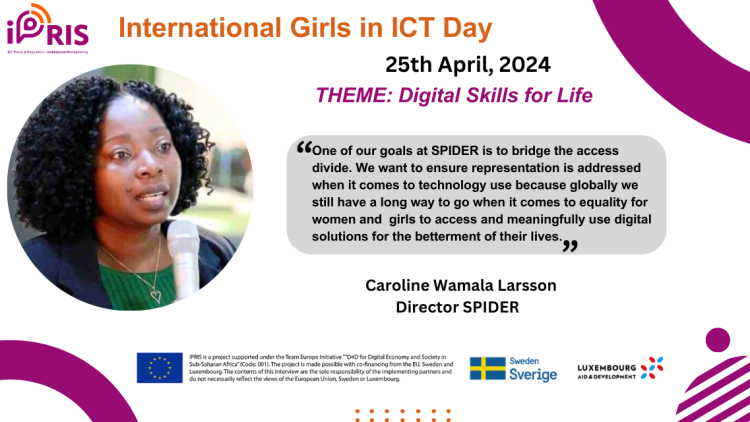
3. Dr. Emma Anna Otieno (Deputy Director, Communications Authority of Kenya)
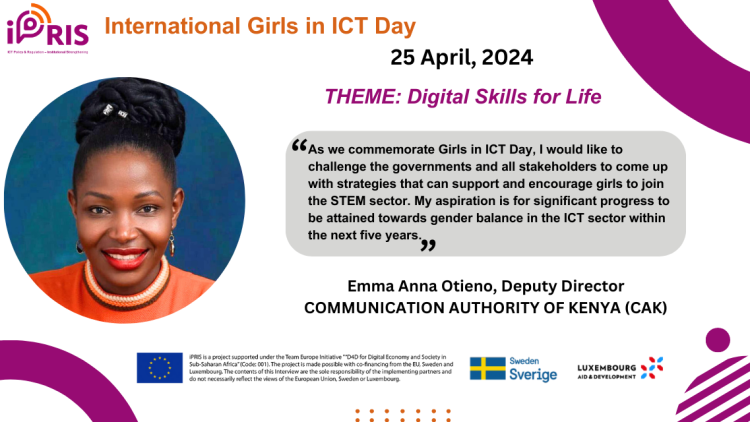
4. Ms Minenhle Rollaine Masuku (Quality Services Engineer Eswatini Community Commission (ESCCOM)
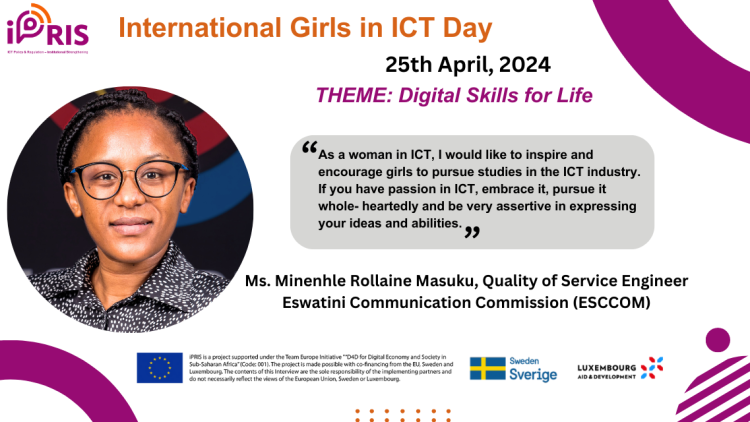
5. Dr. Katja Sarajeva (Program Manager ITP Network and Researcher at SPIDER)
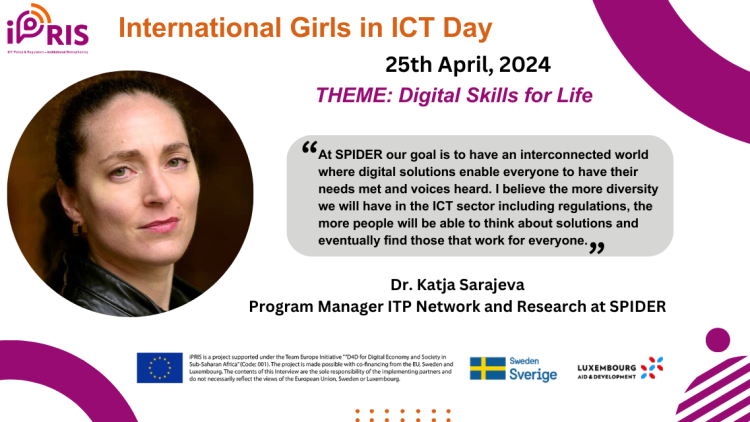
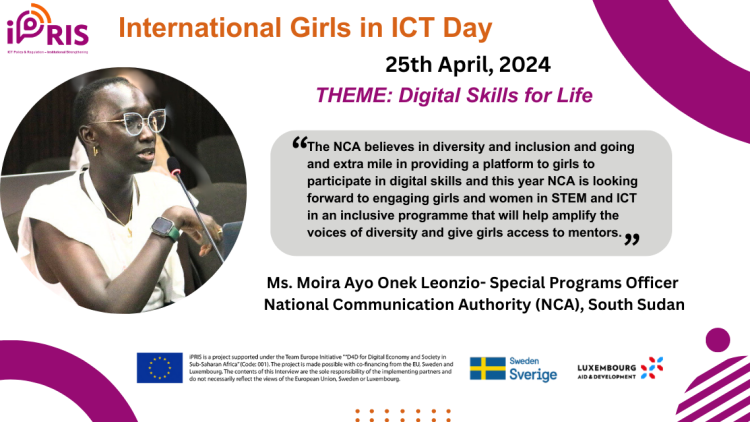
The role of iPRIS
ICT Policy & Regulation – Institutional Strengthening (iPRIS) contributes to bridging the digital divide by boosting the capacities of African telecommunications regulatory bodies. Targeting 43 countries in Africa, iPRIS aims to enhance inclusive digital connectivity and drive social and economic prosperity using ICT.
iPRIS is funded by the European Union, Sweden, and Luxembourg as part of the Team Europe Initiative “D4D for Digital Economy and Society in Sub-Saharan Africa” (Code: 001). The project aims to provide inclusive peer-to-peer capacity-building for African National Regulatory Authorities and Regional Regulatory Organisations, recognising the significance of ICT policies and regulation in promoting digital inclusion, equitable access to the Internet, consumer rights protection, and personal data safeguarding.
By highlighting the achievements of women in ICT and providing role models for young girls, the iPRIS girls in ICT campaign helps to break down notable barriers such as:
Addressing the gender gap
Efforts to address the gender gap in ICT in Africa include initiatives to promote STEM education for girls, provide digital skills training and mentorship programs, support women's entrepreneurship in the technology sector, and advocate for policies and practices that promote gender equality and inclusivity in the ICT workforce.
While progress has been made in some areas, there is still much work to be done to ensure that women and girls in Africa have equal opportunities to participate and succeed in the ICT sector. Continued investment in education, skills development, and gender-responsive policies and programs is essential for closing the gender gap and harnessing the full potential of Africa's digital economy. Girls in ICT Day encourages girls to pursue their interests in technology without fear of discrimination or bias.
For more media related queries/ more information about iPRIS
Please contact,
Ms.Edna Soomre - Project lead, iPRIS
Email: ipris@spidercenter.org
www.ipris.digital
The second day of the iPRIS Africa Regional peer-to-peer capacity building workshop for the 2023 A cohort included sessions on cybersecurity, risk assessment for 5G networks, project management, and broadband deployment.
About iPRIS
ICT Policy & Regulation – Institutional Strengthening (iPRIS) is a capacity-building project that focuses on boosting the capabilities of National Regulatory Authorities (NRAs) and Regional Regulatory Organisations across Sub-Saharan Africa. Targeting 43 countries in Africa, iPRIS aims to enhance digital connectivity and drive social and economic prosperity using ICT. Building on the success of the ICT Regulation Policy and Practice (ITP) program by SPIDER and the Swedish Post and Telecom Authority (2016-2022), iPRIS marks a strategic leap forward, focusing on empowering National Regulatory Authorities in Sub-Saharan Africa, boosting their capacity to shape and implement regulatory frameworks, especially in telecommunications..
The iPRIS project is implemented by The SPIDER (the Swedish Program for ICT in Developing Regions ), The Swedish Post and Telecom Authority (PTS), and the Luxembourg Regulatory Institute (ILR).
iPRIS is funded by the European Union, Sweden, and Luxembourg as part of the Team Europe Initiative “D4D for Digital Economy and Society in Sub-Saharan Africa” (Code: 001). The project aims to provide inclusive peer-to-peer capacity-building for National Regulatory Authorities (NRAs) and Regional Regulatory Organisations (RROs), recognising the significance of ICT policies and regulations in promoting digital inclusion, equitable access to the Internet, consumer rights protection, and personal data safeguarding.
Here are some photo highlights from day 2 of the iPRIS Africa Region peer to peer workshop :
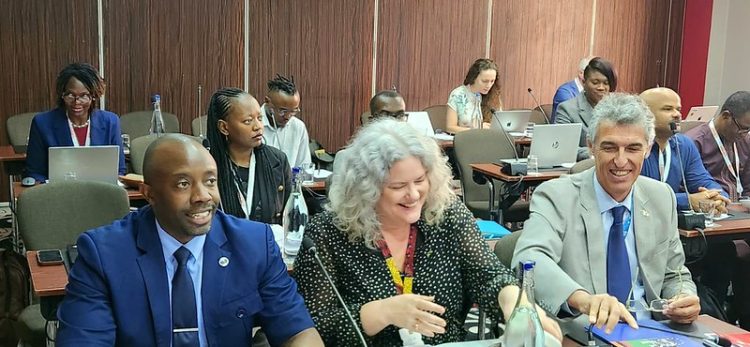
Front from left: Eng. Choolwe Andrew Nalubamba, Ms. Susanna Hughes, Mr Caludio Bacigalupi
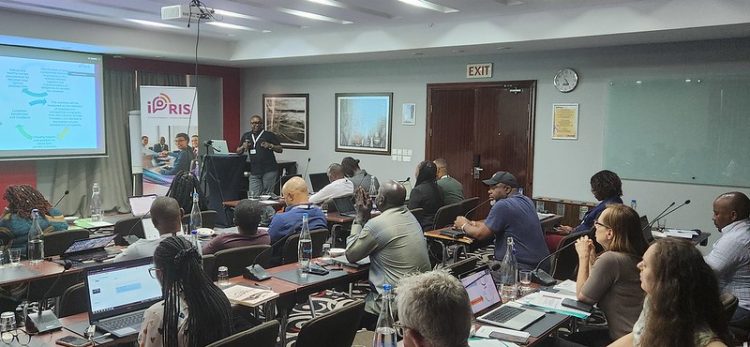
Benson Kekeocha (NCC) presenting CI progress in Zambia
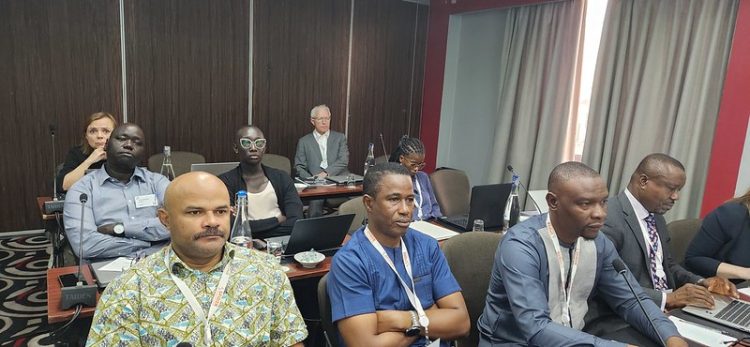
Front row from left: Shaka Sasha Essa, Abdul Bah, Thomas Mohamed Jusu (NatCA), Benson Kekeocha (NCC), Middle row from left: David Deng Kuol, Moira Ayo Onek Leonzio (NCA), Back row from left: Kerstin Borglin, Dr. Bengt Mölleryd (SPIDER)
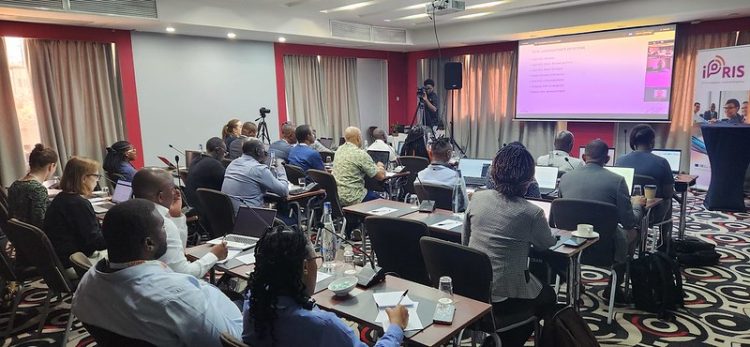
Participants during a presentation in Lusaka, Zambia
The inaugural iPRIS Europe phase training was held in Stockholm, Sweden, from November 12th to 29th, 2023. Participants represented seven of the 43 National Regulatory Organisations (NRAs) in iPRIS: Communications Authority of Kenya (CAK), Communications Regulatory Authority of Namibia (CRAN), Eswatini Communication Commission (ESCCOM), Sierra Leone National Communication Authority (NatCA), National Communication Authority of South Sudan (NCA), Nigeria Communication Commission (NCC), and Zambia Information and Communication Technology Authority (ZICTA).
The workshop provided an opportunity for expert presentations and peer-to-peer exchange among regulators from Europe and Africa.The following regulatory topics under the Joint European Offer were explored:
Institutional and Legal Framework
This topic includes the following sub-areas:
Competition Regulation for a Dynamic Market
This topic includes the following sub-areas:
End User Protection
The following subtopics are explored:
This JEO topic includes the following sub-topics:
Broadband deployment
The topic includes:
Numbering and Addressing
This JEO topic includes:
Secure communications
This topics covers, a theoretical foundation of secure communications, robustness and resilience of the telecom infrastructure, confidential communications, regulation and supervision, and other measures.
New regulatory Issues
This JEA topic includes
Change Initiatives
The participating African Regulatory authorities also developed concepts for change initiatives. Change initiatives are deliberate and structured efforts undertaken to address challenges and opportunities within the ICT sector in SSA. Each initiative is specifically designed to align with the strategic agenda of each regulatory authority and focuses on policy development and implementation.
Change initiatives within iPRIS involve identifying key issues within the ICT sector, such as infrastructure gaps, regulatory inefficiencies, or digital inclusion barriers. The participants also benefited from presentations by experts in project management, gender equality and inclusivity.
The participants also toured Ericsson company in Stockholm

After the 2.5-week training, the participants returned to their countries. The next phase will be a week-long training scheduled to be held in Zambia in March 2024, four months after the European training, to review the progress of the change initiatives, present results, and encourage discussions.
One year after the start of the training round, the implementation of the change initiatives of the participating NRAs will be assessed, fostering continuous improvement.
Borgarfjordsgatan 12, Kista,SWEDEN
Postal Address: Stockholm University, Department of Computer and Systems Sciences/DSV, SPIDER, P.O Box 1073, SE-164 25 Kista, Sweden
Copyright © 2025 iPRIS. All rights reserved.